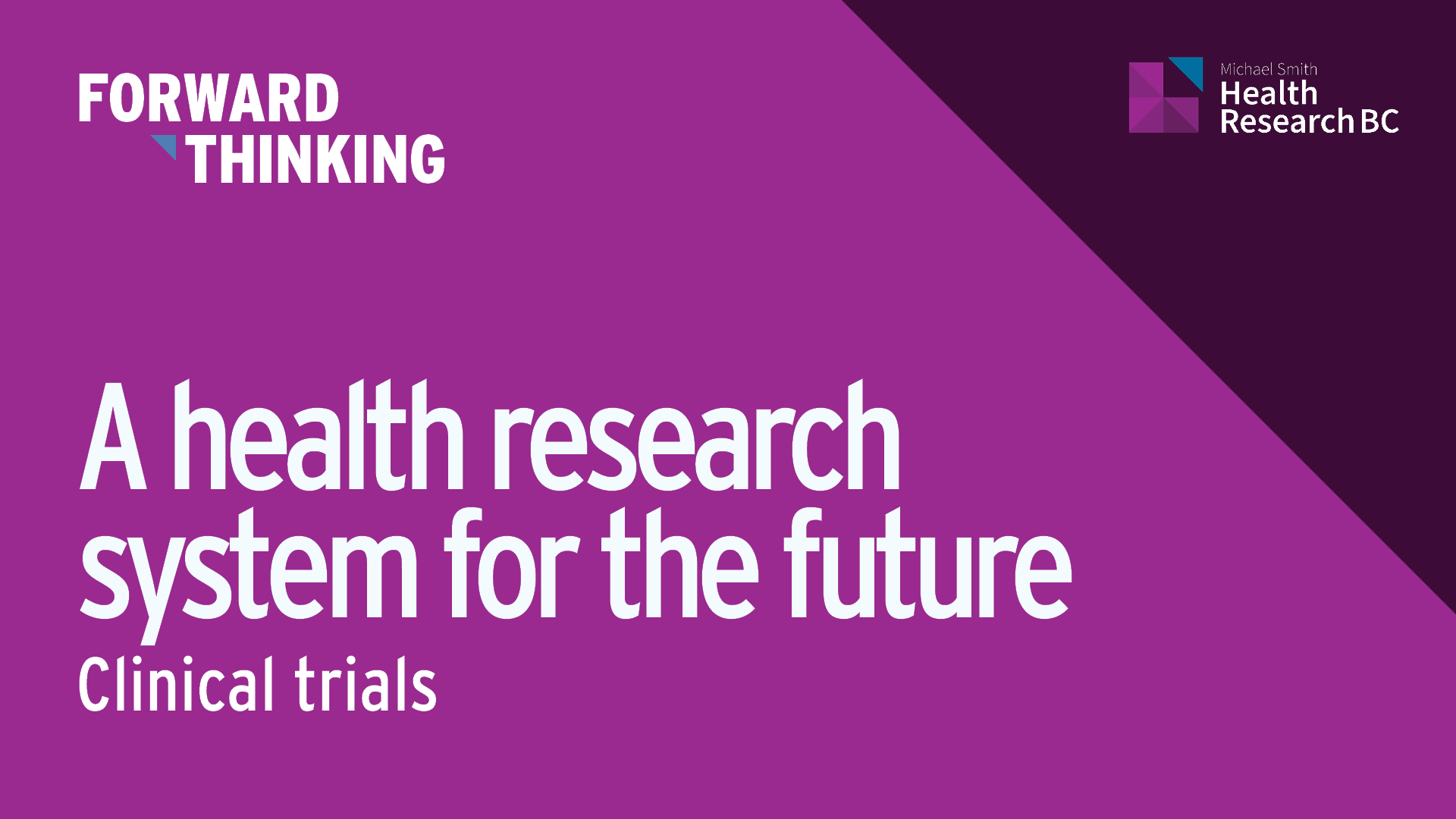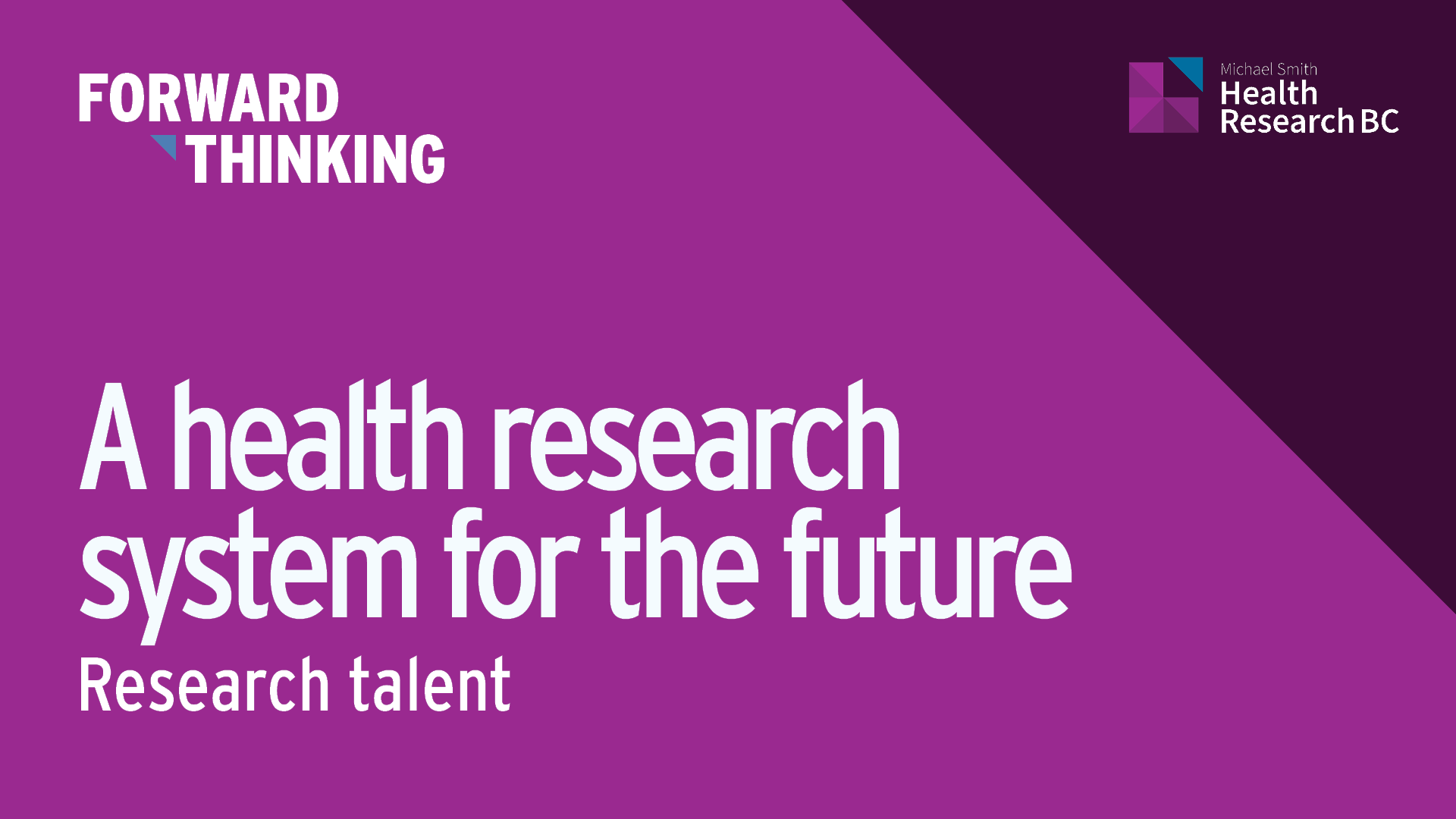What does success look like for responsive and responsible research funding?
27 July 2020

In her most recent Forward Thinking post, Dr. Bev Holmes unpacked what it means to be a responsible and responsive health research funder during a pandemic. With my first Forward Thinking post in my new role as Vice President, Research for MSFHR, I reflect on what success looks like for responsive and responsible research funding.
Forward Thinking is MSFHR’s blog focusing on what it takes to be a responsive and responsible research funder.
First, by way of introduction, I want to share how I came into research.
From a very young age, I was fascinated by the natural world and how plants and animals grow and evolve into complex organisms. That curiosity led me to pursue research in developmental biology. I remember the first time I observed three-dimensional cellular patterns displayed within developing tissues that form the organs of a mature organism. With the aid of a high-powered microscope, I was struck by the exquisitely organized arrays of hundreds of photoreceptor cells that make up the compound eye of the fruit fly, and the nearly perfect alignment of thousands of sensory cells in the developing ear of a mouse.
My curiosity was piqued. Do these naturally occurring patterns have a purpose? Are they important for overall health or survival? And, how do we know? I devoted the next decade of my career in research to studying these patterns and the genetic mutations that disrupt them. I found that disturbances to fundamental biological processes lead to profound consequences to the health or survival of the organism – in this case, loss of sight in the fruit fly, or loss of hearing in the mouse. And, I learned that research using experimental models in science like these can inform applications for human beings, for example, helping to develop therapies for hearing loss.
Mine is just one story about how curiosity drives scientific inquiry and leads to the creation of knowledge that improves human health. For decades, science and health research have advanced our understanding in response to a range of questions – from how the human body works, to what treatments are effective for managing chronic health conditions, to the prevalence of an infectious disease within a population.
Science’s critical role in providing solutions to the most pressing societal challenges has never been more evident than today, as the world grapples with the COVID-19 pandemic. Science helped track the COVID-19 virus and evaluate public health measures designed to slow down the spread of infection. Science will help develop treatments and, ultimately, cures for this disease.
But science doesn’t happen in a vacuum. Scientists need resources and infrastructure to do their work effectively. They need support from partners to ensure that people can benefit from research evidence and insights. As a scientist, I saw science’s potential to help people. This realization made me shift my career from bench science to research funding and policy because I wanted to work with like-minded individuals to create an environment that fosters high-quality research to improve human health.
Success is defined by what you’re trying to achieve
Over my career, I’ve had the pleasure of working for two research funders that have supported world-class research—the Howard Hughes Medical Institute and the Wellcome Trust. What I learned from those experiences is that research funders, large and small, have a vested interest in not only supporting high-quality research, but seeing that knowledge produced from research is used responsibly for the benefit of the greater good. Research funders strive to make evidence-informed decisions to achieve this shared vision, while retaining the flexibility to adapt and respond quickly to emerging challenges and opportunities. But this is easier said than done.
Which leads us back to the question that kicked off this blog: what does success look like for responsive and responsible research funding? This is not a trivial question to answer. Why? Because it depends on what you’re trying to achieve: producing new knowledge through curiosity-led research, applying research into health interventions, using research evidence to improve public health policies and clinical practice, or meaningfully engaging patients and the public in research.
While at the Wellcome Trust, we developed an adaptive framework to measure success across diverse activities connected to the foundation’s mission, and to evaluate success in research relative to where it sat on a continuum and what we were trying to achieve. And yet, we learned that evaluating success in research is challenging; knowing what to measure is difficult, you often don’t have the data or information you need, and being open and transparent about these gaps takes humility and courage.
MSFHR is similarly committed to enabling the link between research funding to health, the health care system, and socioeconomic outcomes. For example, we examine the ways in which research funding builds provincial research capacity and advances timely, relevant, and accessible knowledge with the best chance of influencing health policy and practice, and ultimately improving health outcomes for British Columbians.
As research funders, we recognize the importance of being accountable not only for what, but how we deliver our mission, whether it is to private donors or public entities or society at large. However, there is no consensus on “best practice” in research funding, and there is little understanding of what works, for whom, and under what circumstances.
Success depends on a healthy and motivated research system
Research funders’ success relies on a diverse, creative, and motivated research system. The research system is not the same as it was 30 years ago, a decade ago, or even six months ago. A lot has changed—big data and technology, funding pressures, and urgent societal challenges like a pandemic. The emergency response to COVID-19 has led to significant disruptions to research and the longer-term implications on researchers and research systems are uncertain.
If we accept change has happened and a “new normal” will emerge, should we not ask whether the research system is still ‘healthy’? Should we not also critically reflect on whether what we are doing, and how we do it, will still be effective in supporting research? What lessons or insights could we take into the future to prepare for another major disruption to the research system, like a second pandemic wave?
Last year, MSFHR announced it joined the Research on Research Institute, an international consortium of research funders, publishers, academics, professional societies, and technologists that are collaborating to deliver transformative and translational “research on research.” The consortium seeks to exchange formal and informal information and practices; develop new tools, indicators and evaluation frameworks; and conduct experiments to advance our understanding on how research systems can be made more effective, open, diverse and inclusive. Little did we know at the time what ‘natural experiments’ would spawn from an unprecedented crisis, such as innovations in research funding like rapid response calls, virtual peer review, and open dissemination and communication of research findings. As a strategic partner, MSFHR will use this opportunity to share our experiences and learn from other research funders, as well as develop and test ways in which our contributions to the research system can be made more successful.
British Columbia has been lauded for its agile and rapid response to the COVID-19 public health threat. This is due in large part to continued investment in and support of science and health research. With support from the BC Ministry of Health, MSFHR is committed to leveraging BC’s unique strengths to support health researchers and the health research capacity that we need for the future. But we will need your help—our partners and collaborators in the research system—to achieve success. Through continued collaboration, we will endeavour to foster an equitable, diverse, and inclusive health research system that protects our research talent and maximizes the use of evidence produced from research to tackle the next big societal challenge.





